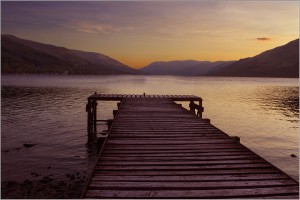Liz and I took advantage of the fine weather with a short break at St. Fillans on the eastern shore of Loch Earn this week. One afternoon, we sat by the Loch , enthralled as a pair of osprey dived and fished in great swoops for over forty minutes. My camera was in the hotel but anyway I had only brought one short, wide angle lens and so the display could be enjoyed without the distraction of photography. Afterwards, I took a walk along the shoreline and stood on a jetty to watch a solitary mallard swimming by; a young woman, late teens – early twenties, was canoeing about ten metres away. Drawing alongside, she told me in a cut glass accent, “This is a private jetty”. Slightly embarrassed, I moved on without protest
Along the shoreline, there is a number of these private jetties, including at the hotel where we were staying. It is acceptable that boat people may own the structures in the Loch but many of these have locked gates, preventing general access to the shore. For centuries, the public have had the right to roam the landscape in Scotland – a tradition linked to the freedom to wander at will known as ‘stravaiging’. This is significantly different to the access permitted in England and Wales, where – even under the new Right to Roam legislation – the public (on foot) have free access only to ‘open country’ (not woodland). In Scotland the public are free to wander anywhere, except in places where they are specifically excluded and this is usually for reasons of their own safety such as in the vicinity of powerful, electrical installations etc.
My young acquaintance probably believes that her class have an inalienable right to private ownership and, unfortunately, in many places that is the accepted status quo. However, my understanding of the 2003 ‘Right to Roam’ Legislation (Scotland) allows the rambler free access to loch shores and most other areas of Scotland.
I should have challenged the young imperialist.

Your interpretation of the position prior to the recent Land Reform (Scotland) Act and its associated Countryside Access Code is not quite correct. Prior to that there was no right to enter privately owned land. The main difference between here and England & Wales was that, in Scotland, trespass was not a criminal offence. If a landowner wanted to prevent you from entering his unfenced land he had to go to court and obtain an interdict against you. The beauty of that was its specifity. It only applied to you and to the specified land. It did not prevent you from trespassing elsewhere or prevent anyone else trespassing on the specified land. So the more socially aware landowners did not bother if no damage or inconvenience was caused. I suspect your encounter on Loch Earn had more to do with attitude than ownership. Pity you didn’t sink the wee hoor’s canoe.
Thanks, Eric and I appreciate that you have much more experience of access law. In retrospect, I surprised myself that I didn’t have a verbal exchange with the woman. As the third para of the blog infers, it was most certainly, in my view, a class attitude.
She probably had her friends in Westminster make the jetty sovereign state of England. Which is the right of all imperialist, you will find. So under different laws.
Guantanemach